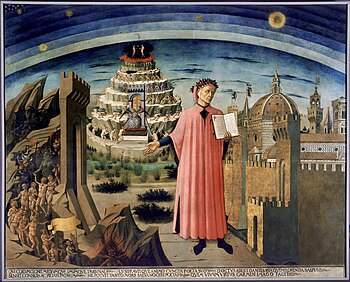 Global Information
Global InformationDivine Comedy information

The Divine Comedy (Italian: Divina Commedia [diˈviːna komˈmɛːdja]) is an Italian narrative poem by Dante Alighieri, begun c. 1308 and completed around 1321, shortly before the author's death. It is widely considered the pre-eminent work in Italian literature[1] and one of the greatest works of Western literature.[2] The poem's imaginative vision of the afterlife is representative of the medieval worldview as it existed in the Western Church by the 14th century. It helped establish the Tuscan language, in which it is written, as the standardized Italian language.[3] It is divided into three parts: Inferno, Purgatorio, and Paradiso.
The poem discusses "the state of the soul after death and presents an image of divine justice meted out as due punishment or reward",[4] and describes Dante's travels through Hell, Purgatory, and Heaven.[5] Allegorically, the poem represents the soul's journey towards God,[6] beginning with the recognition and rejection of sin (Inferno), followed by the penitent Christian life (Purgatorio), which is then followed by the soul's ascent to God (Paradiso). Dante draws on medieval Catholic theology and philosophy, especially Thomistic philosophy derived from the Summa Theologica of Thomas Aquinas.[7] Consequently, the Divine Comedy has been called "the Summa in verse".[8]
In the poem, the pilgrim Dante is accompanied by three guides:[9][4] Virgil, who represents human reason, and who guides him for all of Inferno and most of Purgatorio;[10] Beatrice, who represents divine revelation[10] in addition to theology, grace, and faith;[11] and guides him from the end of Purgatorio onwards; and Saint Bernard of Clairvaux, who represents contemplative mysticism and devotion to Mary the Mother, guiding him in the final cantos of Paradiso.[12]
The work was originally simply titled Comedìa (pronounced [komeˈdiːa], Tuscan for "Comedy") – so also in the first printed edition, published in 1472 – later adjusted to the modern Italian Commedia. The adjective Divina was added by Giovanni Boccaccio,[13] owing to its subject matter and lofty style,[14] and the first edition to name the poem Divina Comedia in the title was that of the Venetian humanist Lodovico Dolce,[15] published in 1555 by Gabriele Giolito de' Ferrari.
Erich Auerbach said Dante was the first writer to depict human beings as the products of a specific time, place and circumstance, as opposed to mythic archetypes or a collection of vices and virtues, concluding that this, along with the fully imagined world of the Divine Comedy, suggests that the Divine Comedy inaugurated realism and self-portraiture in modern fiction.[16]
- ^ For example, Encyclopedia Americana, 2006, Vol. 30. p. 605: "the greatest single work of Italian literature;" John Julius Norwich, The Italians: History, Art, and the Genius of a People, Abrams, 1983, p. 27: "his tremendous poem, still after six and a half centuries the supreme work of Italian literature, remains – after the legacy of ancient Rome – the grandest single element in the Italian heritage;" and Robert Reinhold Ergang, The Renaissance, Van Nostrand, 1967, p. 103: "Many literary historians regard the Divine Comedy as the greatest work of Italian literature. In world literature it is ranked as an epic poem of the highest order."
- ^ Bloom, Harold (1994). The Western Canon. Harcourt Brace. ISBN 978-0-15-195747-7. See also Western canon for other "canons" that include the Divine Comedy.
- ^ See Lepschy, Laura; Lepschy, Giulio (1977). The Italian Language Today. Or any other history of Italian language.
- ^ a b Vallone, Aldo. "Commedia" (trans. Robin Treasure). In: Lansing (ed.), The Dante Encyclopedia, pp. 181–184.
- ^ Peter E. Bondanella, The Inferno, Introduction, p. xliii, Barnes & Noble Classics, 2003, ISBN 1-59308-051-4: "the key fiction of the Divine Comedy is that the poem is true."
- ^ Dorothy L. Sayers, Hell, notes on p. 19.
- ^ Charles Allen Dinsmore, The Teachings of Dante (Ayer, 1970), p. 38, ISBN 0-8369-5521-8.
- ^ Fordham College Monthly. Vol. XL. Fordham University. December 1921. p. 76. Archived from the original on 4 August 2023. Retrieved 12 December 2015.
- ^ Slade, Carole; Cecchetti, Giovanni, eds. (1982). Approaches to teaching Dante's Divine comedy. New York: Modern Language Association of America. ISBN 978-0-87352-478-0. OCLC 7671339.
- ^ a b Emmerson, Richard K., and Ronald B. Herzman. "Revelation". In: Lansing (ed.), The Dante Encyclopedia, pp. 742–744.
- ^ Ferrante, Joan M. "Beatrice". In: Lansing (ed.), The Dante Encyclopedia, pp. 87–94.
- ^ Picone, Michelangelo. "Bernard, St." (trans. Robin Treasure). In: Lansing (ed.), The Dante Encyclopedia, pp. 99–100.
- ^ "Divina Commedia". Enciclopedia Italiana (in Italian). Archived from the original on 18 February 2021. Retrieved 19 February 2021.
- ^ Hutton, Edward (29 August 2014). Giovanni Boccaccio, a Biographical Study. p. 273. Archived from the original on 21 March 2024. Retrieved 21 March 2024.
- ^ Ronnie H. Terpening, Lodovico Dolce, Renaissance Man of Letters (Toronto, Buffalo, London: University of Toronto Press, 1997), p. 166.
- ^ Auerbach, Erich (16 January 2007). Dante: Poet of the Secular World. New York Review of Books. pp. viii–ix. ISBN 978-1-59017-219-3.